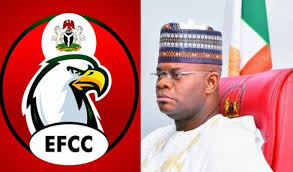The Federal High Court in Abuja has scheduled a ruling for June 26 on an application by the EFCC to cross-examine its third prosecution witness (PW-3) in the trial of former Governor Yahaya Bello of Kogi.
Justice Emeka Nwite adjourned the matter after hearing submissions from the EFCC and defence lawyers regarding the prosecution’s request to cross-examine the witness, a motion that was opposed by the defendant’s counsel, Joseph Daudu, SAN.
The request followed the conclusion of the cross-examination of PW-3, Mr Nicholas Ojehomon, an Internal Auditor with the American International School, Abuja (AISA), by Daudu, who represents the ex-governor.
During the cross-examination, the witness was questioned about the judgment of the FCT High Court, which was admitted as Exhibit 19.
Afterward, Justice Nwite asked the EFCC’s counsel, Olukayode Enitan, SAN, whether he would re-examine the witness. Enitan clarified that he intended to cross-examine Ojehomon, focusing on Exhibit 19.
“I am not re-examining him, I am cross-examining him because they brought this document, my lord,” he explained.
However, Daudu pointed out that the prosecution’s request was not supported by law, according to the Evidence Act. He argued that in order to cross-examine its own witness, the prosecution must first declare the witness “hostile.”
“If you want to cross-examine your own witness, you have to first declare him a hostile witness. You cannot cross-examine him based on the document,” Daudu argued.
Enitan responded by asserting his right to highlight specific paragraphs of the document, similar to how the defence had done.
“Do you have any provision of the law to support this counsel?” Justice Nwite inquired.
Enitan referred to Section 36 of the Constitution, which guarantees fair hearing. He argued that since the court had allowed the defence to tender Exhibit 19, the prosecution had the right to examine it.
“Fair hearing demands that the complainant too has the right to examine this because Section 36 of the Constitution talks of fair hearing,” Enitan stated.
Daudu, however, insisted that Section 36 only allowed for re-examination, not cross-examination, of the witness.
“We are not saying that they cannot re-examine the witness. That is what Section 36 under the law says about fair hearing. But if it is to cross-examine him, they will have to show us the law that backs that,” Daudu maintained.
Justice Nwite then directed both parties to address the court on the constitutional aspects of their arguments.
Daudu emphasised that the prosecution’s approach was not in line with the Evidence Act, citing a case involving Amobi Amobi to support his position.
Enitan disagreed, referencing the same case to argue that the court should allow re-examination of Exhibit 19.
“Having brought it in now, during the case of the prosecution, particularly during the cross-examination of PW-3, your lordship should not allow them to shut us out as that would amount to the court allowing them to blow hot and cold,” Enitan said.
Justice Nwite adjourned the case to June 26 for a ruling and set further dates for trial continuation on June 27, July 3, and July 4.
Earlier in the day, Ojehomon had been cross-examined by Daudu, who asked if the witness had testified in any other courts regarding the school fees paid by the Bello family to AISA. Ojehomon confirmed he had, although he could not recall the specific courts.
He stated that he had never testified against former Governor Bello, either in the current trial or in previous cases, including one involving Ali Bello.
On Thursday, Ojehomon had testified that there were no transfers from the Kogi Government or any of its local governments to AISA for the payment of school fees for the former governor’s children. He also referenced a previous Federal Capital Territory High Court judgment which noted that there was no court order for AISA to return fees to the EFCC or any ruling declaring the money as proceeds of money laundering.
(NAN)


